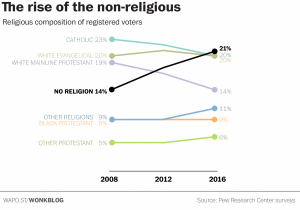For those who couldn’t bear to watch another day of the GOP convention after the opening night mess, The New York Times offers “Republican Convention Day 2: Analysis,” a roundtable featuring real time commentary by their team of political reporters, including Nick Confessore, Maggie Haberman, Adam Nagourney and Alan Rappeport.
Their overall consensus is that Day 2 was a comparatively tame affair, with the exception of Chris “Bridgegate” Christie’s Hillary-bashing, even though Christie himself still faces a federal investigation. Ed Kilgore probes the weird and poorly stage-managed strategy behind the formal nomination of Trump on Day 2. Other than that, there were a couple of yawners by McConnell and Ryan, an endless parade of no-namers, along with “my dad is a nice guy” speeches by Trump’s children, who the NYT panel says did well enough.
The ‘Trump is a nice guy’ meme, which was painstakingly inserted into Monday night speeches as well, seems to be an ongoing concern of his image gurus, probably because Democrats have banked plenty of videos indicating otherwise (This one will do for exhibit “A”). No presidential candidate in history has been more thoroughly exposed on video as mean-spirited at the core, and projecting him as a ‘nice guy’ is going to be a very tough sell.
That’s the short explanation why so many Republican Senate candidates are keeping their distance. Not that they care all that much about Trump’s lack of compassion and decency; they just don’t want to be his collateral damage on election day. In his post, “Is distance from Trump a good reelection strategy for GOP senators?” at The Monitor, Aidan Quigley explains:
As Republicans from across the country gather in Cleveland for the party’s convention, several vulnerable Republican senate incumbents have decided to sit out the convention in an effort to distance themselves from presumptive presidential nominee Donald Trump.
As Democrats try to tie these incumbents to their party’s standard-bearer, Republican senators are staying in their home states to campaign instead of making the trip to Cleveland. Four of the seven Republican senators running for reelection in states that President Obama won twice are staying home..
“For the ones who are running in swing states or Democratic leaning states, it’s a necessary strategy to survive,” Alan Abramowitz, a professor of political science at Emory University, tells The Christian Science Monitor.
Increases in polarization, partisanship and straight-ticket voting make it difficult for Senate incumbents to escape the “downdraft” from Trump at the top of the ticket, he says. He expects Trump to lose in most of the Senate battleground “swing states”, which will force the incumbents to try to gain votes from voters who vote for presumptive Democratic nominee Hillary Clinton for president. This is a very difficult challenge, he says.
“Pretty much all of them, to varying degrees, are trying to distance themselves from Trump to run on their own record and separate themselves as much as possible, to try to localize the election,” he says. “The problem is that voters increasingly see these choices they’re making in Senate and House elections as not just choices about who they want to represent them in their own state, or their own district, but as which party do they want to control the House or Senate.”
Quigley explains the art of Trump avoidance, as practiced by Republican Sens. McCain, Toomey, Portman, Rubio and Ayotte. Quigley closes with a salient observation by Abramowitz: “Republican candidates will try to separate themselves from Trump as much as possible, and try to localize the races. Democrats are going to try to nationalize the races,” he says. “In recent elections, the side that tries to nationalize the race has generally been more successful.”
For Democratic strategists, the hope is that Republicans will over-invest in doomed Senate candidates, while under-investing in endangered House seats. If that scenario unfolds in a blue wave election, the Republican legislative blockade will crumble into memory.









